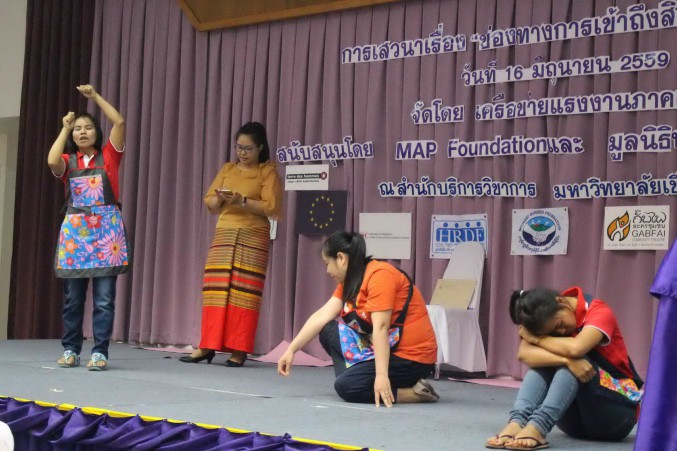Thailand has the opportunity to extend full labour rights to the invisible workers of society–the cleaners, housekeepers and maids–who are so often locked out of labour protection laws, according to speakers at an International Domestic Workers Day conference in Chiang Mai, Thailand.
Several domestic workers–mostly Shan women from eastern Burma–attended the seminar at Chiang Mai University on Thursday, when they heard from the city’s deputy mayor, as well as migrant rights activists, union officials and a spokesperson from the International Labour Organisation.
Describing the conditions that many domestic workers face when working in Thailand, 29-year-old Muay Leng from Shan State told DVB about some of her experiences working in Chiang Mai for 14 years.
“Domestic workers don’t usually receive many rights. The workers themselves don’t even know their own rights,” she said, adding that one of her key concerns is the safety risks that domestic workers face in their average day.
“Employers often make domestic workers live in storage rooms, and they don’t have their own key so they can be very vulnerable to the man in the house.”
She also spoke of the lack of protection that domestic workers receive when they are handling cleaning chemicals, and occupational health and safety.
Migrant Assistance Program Foundation (MAP) director Brahm Press said, “As it stands now, the law does not provide formal protection for migrant domestic workers. They are considered ‘aliens’ in Thai government terms, so we feel that domestic workers and all migrant workers deserve their full labour rights.”
Domestic work is not included in Thailand’s labour laws as it is not classified as formal work. In 2012, an amendment (regulation No.14) was made to the Labour Protection Act that establishes regulations for days off and sick leave for domestic workers, and requires monthly payment of wages; however it does not establish a minimum wage.
In a recent report by MAP surveying 139 Burmese migrants, it was found that domestic workers and agriculture workers were paid the least compared to other occupations. The survey also noted that the majority of domestic workers are paid monthly and work an average of 13-14 hours per day.
The minimum daily wage in Thailand of 300 baht (US$9) should ensure a monthly salary of 7,200 baht (US$221), however most surveyed workers said they only receive 4,300-5,000 baht.
[related]
MAP director Press said the repercussions for employers who fail to comply with the law is virtually non-existent. He said labour officials need to “improve complaint mechanisms and follow up with enforcement.”
Chiang Mai Deputy Mayor Natthachudej Wiriyadiloktham attended Thursday’s event. He opened his address by pledging support to protect migrant domestic workers.
“No one should be exploited or treated less than equal. And if they do experience these abuses, I invite them to come to my office and report it,” he said.
But Natthachudej defended the authorities, stating: “There are 25 districts in Chiang Mai and we do not have officials in all the districts, so it is difficult to monitor all the districts.”
Domestic workers at the event called for their basic workers’ rights to be respected, including a minimum wage and payment for overtime, registered days of rest, and social security coverage for injury or illness.
There are an estimated 150,000 domestic workers in Thailand; the majority of those are migrants from neighbouring countries, especially Burma.



